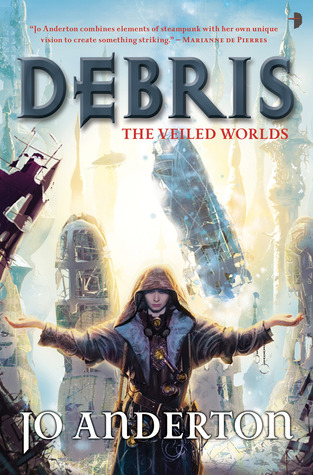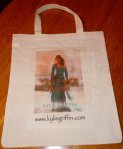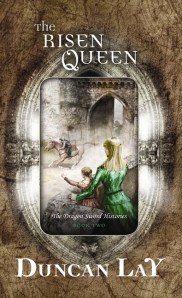As the next of my series featuring fantastic female fantasy authors (see disclaimer) I’ve invited the talented Kylie Griffin to drop by.
Kylie has her first book due out in 2012. I thought it might be interesting for readers to hear from a writer who is at this point in their career.
 Q: First let me say congratulations. You must have been over the moon when you go the Call with the offer of a contract! Your first book Vengeance Born is due out from Berkley in February 2012, with two more in The Light Blade series already contracted. Have you been working on this series for a long time?
Q: First let me say congratulations. You must have been over the moon when you go the Call with the offer of a contract! Your first book Vengeance Born is due out from Berkley in February 2012, with two more in The Light Blade series already contracted. Have you been working on this series for a long time?
Hi, Rowena, thanks for inviting me and for the congratulations. I was over the moon getting the Call (and the three-book deal just thrilled me). You work so hard that when it happens there’s a real sense of disbelief that you’ve finally achieved that goal, then you run the gamut of emotions, from elation to relief and happy-crying, LOL.
To answer your question, I wouldn’t say I’ve been working on the Light Blade series all that long but I do think the foundation for writing a fantasy romance series has been building over many years.
I’m an avid fantasy reader from way back – Anne McCaffrey, Andre Norton, Mercedes Lackey, David Eddings, Isobelle Carmody and their books (and your T’En series), just to name a few. All of their books had a huge impact on me growing up – and I wanted to write fantasy but with a romance interwoven through the story. I love putting a hero and heroine together and watching their story unfold, usually helped along by an epic-style external plot.
VENGEANCE BORN started out as a stand-alone book in 2007 with all the elements I love about fantasy – world-building, empires and wars, other races – demons, human warriors, hybrids, a goddess – but there’s also the story of the main character’s romance. Then, as I wrote, some of the secondary characters began demanding that I write their stories.
While I’ve a three-book contract there’s another four characters clamoring for attention. Whether they’ll be written remains to be seen. 🙂 I hope readers will get the chance to meet them.
Q: In your day job you are a teacher, but your passion is writing, specifically fantasy-romance. There are a lot of paranormal-romance on the shelves now days, but not so many fantasy-romance. For readers who don’t know the genre, how would you describe it?
I like to think of fantasy romance as being a combination of traditional fantasy and traditional romance.
You get all the fantasy elements, as in a cast of characters, plot archetypes, world-building, magic, etc. yet with the additional element of a romance thrown into the mix, and you end up exploring the gamut of relationships – political, social and romantic.
I love the appeal of having the best of all worlds in my stories (no pun intended *grin*).
Q: That leads to – what drew you to write in this genre and its associated sub genres?
 My heart belongs to the genre – specifically fantasy romance, science fiction romance and post-apocalyptic romance – I love, live and breathe it. I can’t remember a time I wasn’t fascinated by it.
My heart belongs to the genre – specifically fantasy romance, science fiction romance and post-apocalyptic romance – I love, live and breathe it. I can’t remember a time I wasn’t fascinated by it.
My earliest exposure to this genre was as an impressionable 6y.o. watching a rather scary episode of Dr.Who (a British SF TV series), being terrified but at the same time fascinated by the whole concept of time-lords and travelling to different worlds with varying technologies etc.
I also grew up devouring every book, TV show and movie in this genre – Star Wars, Star Trek, The Hobbit, the Dragons of Pern series, the Witch World series etc. Writing my own stories seemed just a natural extension.
The pure escapism of writing about characters who exist in an imaginary world, the vast scope of story lines, the human to non-human range of characters, the development of a romance and the challenge of making everything so real as to suspend a reader’s disbelief. I just love it!
Q: You are known as the Contest Queen because you have placed and won so many Romance Writers competitions. (Kylie is a member of RWAustralia, RWNZ and RWAmerica). You won the RWAmerica Golden Heart (Paranormal section), the Emma Darcy, the Valerie Parv, the Clendon, the Emily and have placed man times in the RWAust Emerald Award. I know how advantageous it is to an aspiring writer to join these organisations and to enter these awards, but the readers might not. Would you like to explain how placing and winning awards helps a writer’s career?
This is a great question, Rowena. You’d think the purpose of entering a contest would be to win, and for some writers this might be valid. When I first started entering contests, I didn’t have a writing group or a critique partner service to draw on for feedback, so this was a way of meeting that need and improving on my skills as a writer.
These days many writing organisations have other services like critique partner schemes, isolated writer programs or writing groups. So it’s one of many ways, not just the only way, to receive feedback.
A lot of the larger publishing houses these days don’t take unsolicited manuscripts ie. you need an agent to represent you to get editors to look at your work. The houses I were aiming for – Berkley, St.Martins, EOS, Harlequin LUNA, Grand Central Publishing – no longer accepted unagented submissions.
So, another strategy I employed was to look at the final judge of the contest. It’s usually either an editor or agent who acquires/represents the genre you’re writing in. Reaching the final round or placing in contests gets your work in front of these specific editors and agents. You can bypass what’s affectionately known as the “slushpile” or the “no unsolicited submissions” rule.
Another reason for entering and aiming to place in contests is that it builds your contest resume and gets your name “out there”. Including this this contest success list in your query letters to agents and editors or when pitching in person to them can make your work stand out. It can also show that your work has consistency and that it also had a potential readership.
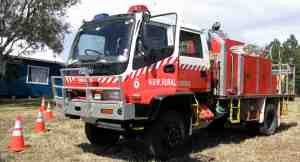 Q: By day you are a mild mannered school teacher but your alter-ego is a Rural Fire Fighter, State Emergency volunteer and Community First Responder (responds to 000 calls). You must be drawn towards helping people in dangerous situations. Could you tell us about some of the experiences you’ve had?
Q: By day you are a mild mannered school teacher but your alter-ego is a Rural Fire Fighter, State Emergency volunteer and Community First Responder (responds to 000 calls). You must be drawn towards helping people in dangerous situations. Could you tell us about some of the experiences you’ve had?
I find a lot of satisfaction in helping people, that’s true.
I’ve spent most of my teaching career in small, isolated rural areas and getting to know the people and families in these villages and surrounding farmlands is something that evolves. There’s a huge sense of mateship or looking out for one another because you have to and you know one day you may need their help too.
Also, from a more pragmatic point of view, there tends to be a lack of emergency services (or swift access to them), so that need to help one another tends to be a way of life in these communities but in this day and age that means volunteering and gaining qualifications and along the way you make some great friends, not to mention learn skills you may never have experienced had your life taken a different path.
Some emergencies do hold an element of danger but that’s something our training helps us to prepare for and deal with. In the Rural Fire Service I’ve been to everything from bushfires (some deliberately lit, others started by lightning strikes) to house fires. On the scare factor scale, being a fire-fighter is probably the most immediately dangerous occupation of all the services I’m involved in.
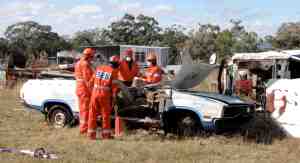 I’ve been a member of the State Emergency Service for 15 years and in that time have participated in several searches for missing people and gone away on out of area calls as a part of a flood and storm damage crew (tarping houses, removing trees, evacuating people from their houses during floods), eg.most recently Cyclone Yasi and the devastating floods in Queensland. Because of our geographic isolation, our unit also responds to road crashes and I’ve helped extricate people trapped in vehicles and, unfortunately, I’ve also assisted with body retrieval when the casualty has died.
I’ve been a member of the State Emergency Service for 15 years and in that time have participated in several searches for missing people and gone away on out of area calls as a part of a flood and storm damage crew (tarping houses, removing trees, evacuating people from their houses during floods), eg.most recently Cyclone Yasi and the devastating floods in Queensland. Because of our geographic isolation, our unit also responds to road crashes and I’ve helped extricate people trapped in vehicles and, unfortunately, I’ve also assisted with body retrieval when the casualty has died.
I’m also one of five SES members who’ve trained with the New South Wales Ambulance Service as a Community First Responder – an advanced first aider (similar training a junior ambulance office receives). We have a vehicle outfitted with almost everything you see in an ambulance. Over the last few years I’ve attended numerous emergency call outs, everything from broken limbs, heart problems, asthma attacks, amputations, severe burns, to performing CPR on casualties.
Not every emergency situation has ended well but I get a huge amount of satisfaction knowing my team mates and I are able to provide help when it’s needed. Our community appreciates it too. A couple of examples, one of the local oldies bakes us cakes and other goodies when we’re on 24hr flood duty, a passing motorist we helped free from floodwater sent us a large box of chocolates and a wonderful thank you card, and a family whose house we saved from burning down made a lovely donation to the fire unit.
Q: I was prompted to start this series of interviews because there seems to be a perception in the US and the UK that fantasy is a bit of a boy’s club. Do you think there’s a difference in the way males and females write fantasy?

The 'Front door Dragon' that Kylie commissioned a local stained glass artist to make for her.
Personally, I’m saddened to think that there is this sort of perception out there. We have such a rich diversity of authors, male and female, who love writing in this genre and each bring their own unique styles and stories to our bookshelves.
Even if there is a difference in the way male and female fantasy authors write, isn’t the sole purpose of writing to entertain the reader (and ourselves)? We all do it in different ways and it’s the diversity that feeds and entertains the reader.
As a fantasy author, this is the way I prefer to think of myself.
Q: Following on from that, does the gender of the writer change your expectations when you pick up their book?
I’m a huge believer that the story is paramount. I read the back cover blurb with the expectation of being sucked in – if it hooks me then I’ll read it regardless of the gender of the author.
As a reader I want to be engaged, I want to identify with the characters, I want adventure in whatever form it comes. I want to be entertained for a few hours. If the author’s writing does all this, then mission accomplished.
It’s as simple as that.
Q: And here’s the fun question. If you could book a trip on a time machine, where and when would you go, and why?
Oh, the possibilities are endless. This is so not a fair question!!! LOL
I have a passion for ancient civilisations – the Romans, the Vikings, the Greeks, the Mayans, the Egyptians, the Celts – so anywhere/anywhen with them would be amazing.
I also like alternate histories. Exploring alternate turning points in the present would be fascinating, a bit like the Choose-Your Own-Adventure stories where you decide which pathways determine your present story line.
But I also love the unknown future – what will humanity be like in a hundred or a thousand years? What technology will we be using? Do we share this universe with any other race? So, going forward in time would be fun too!
Thanks for this opportunity to be interviewed, Rowena. It’s been a hoot and I’ve really enjoyed answering your questions.
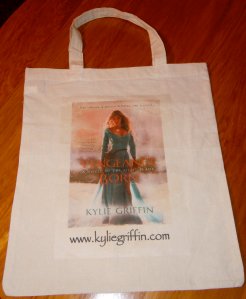 Give-away Question:
Give-away Question:
Kylie says: While I haven’t received my author copies of VENGEANCE BORN, I do have a eco-friendly tote bag with the cover of my book on it to give-away.
I’ve shared a little bit about some of the fantasy authors who’ve have impacted me as a reader and writer. So, which books and fantasy world/s have made an impression on you and why?
Follow Kylie on Twitter: @KylieGriffin1
See Kylie Griffin’s Blog.
Follow Kylie on GoodReads.
Follow Kylie on Facebook.
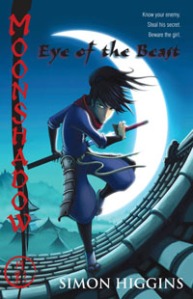 Simon says: (Sorry, couldn’t help myself!)
Simon says: (Sorry, couldn’t help myself!)

